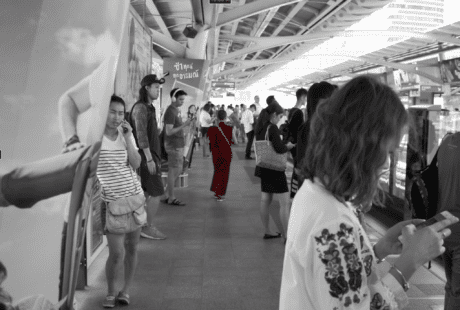Millennials Facing Challenges
Millennials are facing challenges in many segments of their life. Here, in a public talk given in Singapore, Phakchok Rinpoche discusses some of these issues. Although Rinpoche was raised in a traditional Himalayan environment, he has traveled widely in Asia, North America, and South America. Also, he has specifically sought out young audiences, both Buddhists and non-Buddhists. As he interacts with young people around the world, he has identified challenges that are greater in the 21st century.
Millennials facing challenges: What do 21st century human beings look like?

Rinpoche observes that he is now more worried than ever about young Buddhists. Historically, we had fewer attractions. Games, for example, are so attractive now. Even older people are playing! What is the benefit? Aren’t we just wasting time — not making money for families or ourselves? And spiritually or on a meditation level, we see how our minds become involved with negative things like killing or destroying things. Moreover, violent or bad games always seem more attractive or popular. Killing in the game is not a big deal, so you get better as you play. Nowadays, Rinpoche notes that when he checks himself more and more, his mala (prayer beads) is not always in his hand, but the phone is.
Millennials: Born into Distraction
We have to be honest about our current situation. Young people are born into this. Millennial Buddhists live in this world. And one of the biggest issues Rinpoche sees now is distraction. Just look around at the internet and high tech phones. We don’t have time to just sit for several minutes with a few thoughts and just think. Already, if we do that, we feel we are missing something. Yet in the past, we never felt like we missed anything. Speaking from his own experience, we need to hold the phone like a mantra chanting. This is a challenge that young Buddhists face that older people didn’t face. Older people had more of a chance to improve, and for younger people, that is much tougher. Your mind is not able to settle down faster. Technology is so fast and it improves so quickly.
These days, Rinpoche says that when he goes to sleep he holds an iPad. In the past, it was a book. Nowadays, he admits that as he wakes in the morning, the first thing he checks is his messages. Previously, he thought of compassion and bodhicitta. It is a slight change, but it is a fundamental change. Why? The first thought of the day is not a worthy thought. Not bodhicitta. We need to think about this, remind ourselves, and investigate: what is the result? Too many quick-firing thoughts in our heads. Nowadays we talk about everything. Our thinking becomes so big, so varied and we become a “jack of all trades and master of none.” Or more simply, we become a jack of all thinking, and nothing is accomplished.
The Problem of Thinking
There is too much thinking, but what is the problem with that? We might say this is not a problem. The problem is this: your things, your stuff, your feeling, everything is about “you, you, you.” Of course, we all have egos: from ancient times until now. But nowadays, we become so focused on ourselves. We can see changes in developed countries and emerging countries. Look at the challenges people go through. The problem is we think constantly about “me.” Everything is about my interests, my talk, and my preferences. My tastes and opinions become much more manifest.
Planning for the Future
Maybe we think this is not a big deal: we can train new psychiatrists or psychotherapists to help us. Rinpoche says that when he talks to young people today, they don’t know what their plans are. They say, “I don’t know.” Before, it was easier. We had a clear path. Nowadays, we don’t have time to plan for the future. And you never learn without planning, taking risks, or failing. You need to fail sometimes, like building up your immune system. Poor guys. It is shocking how fast technology is improving. You talk to your friends, but they don’t know either. Then you talk to your parents, but you don’t like what they say.
Nowadays we say we want to explore. Explore — what is the result of that? We ask, “Why am I here on this earth?” This is a very modern question. “What is the meaning of life, I don’t see the purpose. What should I do?” We don’t know what to depend on. We don’t know. Before, parents said you were here to work, get married, and feed your family. Now we just explore, explore, explore and we either have no interests or we have too many interests. These are the new-age problems. Rinpoche doesn’t have solutions, but he points out that these are the challenges. Your ego is too obvious. You have so many choices. We have so much greed and no contentment. Everything has to be “plus” or in new colors like iPhones, right? Where is the end of this?
Marketing to Millennials
Nowadays marketers study our minds so carefully. We are already victims because marketers know exactly what we want. This means our choices are not really our own. Rinpoche points out that he is talking about real issues for us. We’ve had greed imposed on us from outside. It is amazing. And this means our children have even more of a tendency to be manipulated. For this reason, Rinpoche says that young people need to be very careful and remind themselves. We need to realize what is happening.
Rinpoche says he can see advertisements and understand the idea of what is happening. What car you drive doesn’t actually change who you are. But right now we have a “shopping sickness,” we need to keep buying. Instead, try to think about limits and how to give things away. Know what you really need and have limits. Rinpoche’s point is that our desires are so strong, we don’t know how to be happy. We always want more. Advertising and fashion books are too clever. Fashion designers study and predict a year in advance; they study the trends and guess what we will want. We need to develop more immunity against this. In America, particularly, movie advertisements are so strong. Two seconds on the benefits of medicine and twenty seconds on the side effects. We need to study this and see what is going on.
Millennial Tech Addiction
Even young children are addicted to games. Rinpoche gives an example of his own son’s desire to feed game animals. And our time goes so fast! Our mind has no time to relax. Before, Rinpoche used to always complain about how temples are built so far away from cities. But now, as he travels through cities, he sees our constant busy patterns. And busyness leads to the feeling we are missing out. We complain, “my friends, my whole gang is doing something, but I’m missing out. My friends are playing games, but I’m not doing it. I’m losing points.” Now we can’t put down our phones for 5 minutes.
Breaking Addiction with Tech Breaks

21st-century changes need different prescriptions. If we only rely on ancient teachings, we don’t know how to give solutions or advice for 21st-century changes. 1000 years ago phones and computers didn’t exist. Within thirty years, there has been so much development — just like weapons — they are so accurate and can kill so many people. We’ve gone from musket balls to super-accurate weapons.
But really, Rinpoche’s main interest is the effect on our minds. He is concerned about technology and its effect. Therefore, he says, take some “Tech Breaks”. Three-to five-minute breaks. Put your phone in silent mode. Without that, you are going to be hooked.
Millennials Need Contentment
 Competitiveness, jealousy, and pessimism are stronger these days. And pessimism is the result of our jealousy and competitiveness. Instead, we need to change our approach. When we see someone has something much better than us –rejoice! Say, “I’m happy for you!” Think that others have more merit. Competitive minds are never-ending. Competitive mind and jealousy may help us a little at work, but it reinforces the message, “I don’t have, I don’t have, I don’t have.” Think of people uploading photos to Instagram wearing solid gold watches. And then we start liking people or following people because we feel like failures. Do you see how we are comparing ourselves and creating a negative pattern? We believe things so easily. The more jealousy or competitive our mind is, the more we have a strong feeling of “I don’t have.” The result is less contentment. The feeling of “I don’t have it” is so strong. We need to build a steady base of contentment to face the modern world.
Competitiveness, jealousy, and pessimism are stronger these days. And pessimism is the result of our jealousy and competitiveness. Instead, we need to change our approach. When we see someone has something much better than us –rejoice! Say, “I’m happy for you!” Think that others have more merit. Competitive minds are never-ending. Competitive mind and jealousy may help us a little at work, but it reinforces the message, “I don’t have, I don’t have, I don’t have.” Think of people uploading photos to Instagram wearing solid gold watches. And then we start liking people or following people because we feel like failures. Do you see how we are comparing ourselves and creating a negative pattern? We believe things so easily. The more jealousy or competitive our mind is, the more we have a strong feeling of “I don’t have.” The result is less contentment. The feeling of “I don’t have it” is so strong. We need to build a steady base of contentment to face the modern world.
Resources for developing resilience:
- Training the Mind: An Introduction, an on-line meditation course centered on Phakchok Rinpoche’s teachings.
- Blog Post: Distraction: Tools to Avoid the Daze
Reflection Question and Sharing Your Experience
We all are facing more distractions and competition for our time. How have you discovered ways to develop resilience? Do you take technology pauses in your family and work-life?
Reflect for a few moments on contentment. How can you personally practice bringing your attention back to acknowledge your basic contentment? Do you do this already, and, if so–what works for you? And how do you encourage others to practice contentment?










Responses
A very apt teaching, comsidering I have spent the day helping Jess my wife with her new phone, both marvelling at what it can do and how quick it can do it… ahhhhhhh let it go.
I love this teaching. My 18-year-old granddaughter was asking me just two days ago what it was like to grow up without so much technology and she was saying that she wishes she could have grown up at such a time. She just gave up her Facebook account